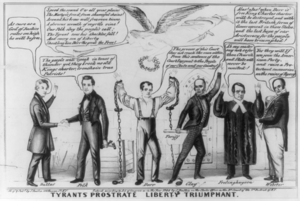Dorr Rebellion
| Dorr Rebellion | |||||||
|---|---|---|---|---|---|---|---|
 A polemic applauding Democratic support of the Dorrite cause in Rhode Island, 1844 |
|||||||
|
|||||||
| Belligerents | |||||||
|
|
|
||||||
| Commanders and leaders | |||||||
| Samuel Ward King | Thomas Wilson Dorr | ||||||
The Dorr Rebellion (1841–1842) was an attempt by middle-class residents to force broader democracy in the U.S. state of Rhode Island, where a small rural elite was in control of government. It was led by Thomas Wilson Dorr, who mobilized the disenfranchised to demand changes to the state's electoral rules. The state was still using its 1663 colonial charter as a constitution; it required that voters own land. A later legislative rule required that a man be white and own $134 in property in order to vote.
In addition to disenfranchisement of individuals, the state was dominated by rural interests. It had maintained representation in the legislature by towns. Under this geographic system, the larger populations in cities were dramatically under-represented. The effect in the 1830s was that the rapidly growing industrial cities were far outnumbered in the legislature by representatives of rural towns, to the annoyance of major businessmen and industrialists of the cities. The state legislature lagged in investing in infrastructure and other needs for urbanizing areas, and generally did not respond to urban needs. Furthermore, because of the property requirement, few immigrants or factory workers could vote, despite their growing numbers in the state.
In 1840 other states that had been receiving immigrants had a huge surge in turnout, but Rhode Island voting remained suppressed.
At first, the middle classes took the lead in seeking change, including Dorr himself. He worked with the Rhode Island Suffrage Association. But the Charter government, controlled by rural elites, fought back hard. For six weeks in 1842, there were two rival governments. The Dorrites, led by self-proclaimed Governor Dorr, pulled back from violence (after their cannon misfired). Only one person died, a bystander killed by accident.
The Charter government compromised. It wrote a new constitution in 1843 that dropped the property requirement for men born in the United States but kept it for foreign-born citizens, and it apportioned more seats in the legislature to the cities. That satisfied the native-born protesters.
The state government had the upper hand; the national government refused to intervene, and Democrats in other states gave Dorr only verbal encouragement. His cause was hopeless—he and five lieutenants were sentenced to life in prison. They were pardoned by the state governor in 1845 after the political agitation had ended. But the state did not drop the property qualifications for immigrant voters until 1888, at a time of increasing immigration.
In the 1844 presidential election following the Dorr Rebellion and changes to voter requirements, some 12,296 votes were cast in Rhode Island, a significant increase from the 8,621 cast in 1840.
...
Wikipedia
